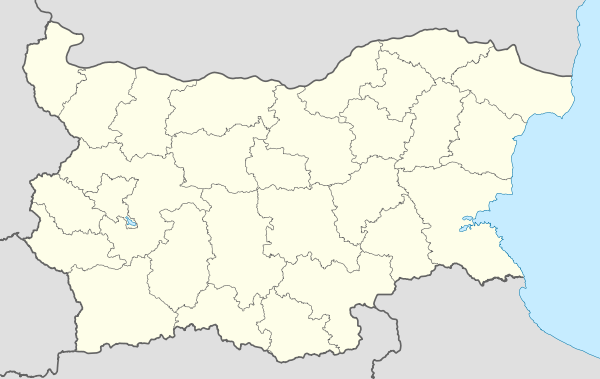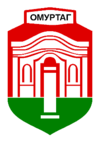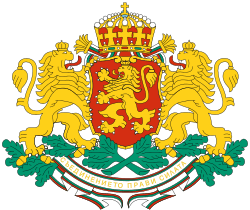Omurtag (town)
| Omurtag Омуртаг | ||
|---|---|---|
|
View of Omurtag | ||
| ||
 Omurtag Location of Omurtag, Bulgaria | ||
| Coordinates: 43°6′0″N 26°25′1.2″E / 43.10000°N 26.417000°ECoordinates: 43°6′0″N 26°25′1.2″E / 43.10000°N 26.417000°E | ||
| Country | Bulgaria | |
| Province (Oblast) | Targovishte | |
| Elevation | 525 m (1,722 ft) | |
| Population (Census February 2011)[1] | ||
| • City | 7,369 | |
| • Urban | 24,876 | |
| Time zone | EET (UTC+2) | |
| • Summer (DST) | EEST (UTC+3) | |
| Postal Code | 7900 | |
| Area code(s) | 0605 | |
Omurtag (Bulgarian: Омуртаг) is a town at the eastern foot of Stara Planina in northeastern Bulgaria, part of Targovishte Province, situated at 525 m above sea level. It is the administrative centre of the homonymous Omurtag Municipality. As of February 2011, the town has a population of 7,369 inhabitants.[1]
A notable native is Aleksandar Aleksandrov, one of the two Bulgarian cosmonauts.
History


The area around the modern town has been inhabited since the Neolithic. Part of Justinian I's defensive system in the 6th century, the region gained importance as part of the First Bulgarian Empire due to the proximity to the capitals Pliska and Preslav and the passes of Stara Planina.
The first written evidence of the modern town dates from the 17th century, when it was mentioned as the kaza centre Osman Pazarı in Ottoman tax registers. The settlement was a centre of craftsmanship and trade.
Osman Pazarı was liberated from Ottoman rule on 27 January 1878 by Russian troops under Johann Casimir Ehrnrooth during the Russo-Turkish War of 1877-78. Most of the Turkish inhabitants of the town left and were replaced by Bulgarians from around Tran and Kyustendil.
Omurtag acquired its present name in 1934, named after the Bulgarian khan Omurtag.
Population
| Omurtag | |||||||||||||||
|---|---|---|---|---|---|---|---|---|---|---|---|---|---|---|---|
| Year | 1887 | 1910 | 1934 | 1946 | 1956 | 1965 | 1975 | 1985 | 1992 | 2001 | 2005 | 2009 | 2011 | 2013 | |
| Population | no data | no data | no data | 4,233 | 6,127 | 8,161 | 9,082 | 9,505 | 8,941 | 8,893 | 8,867 | 8,725 | 7,369 | ?? | |
| Highest number 10,160 in 1980 | |||||||||||||||
| Sources: National Statistical Institute,[1][2][3] „citypopulation.de“,[4] „pop-stat.mashke.org“,[5] Bulgarian Academy of Sciences[6] | |||||||||||||||
References
- 1 2 3 (Bulgarian) Bulgarian National Statistical Institute - Targovishte Province - Census 2011
- ↑ (English) Bulgarian National Statistical Institute - Bulgarian towns in 2009
- ↑ (Bulgarian)National Statistical Institute - Towns population 1956-1992
- ↑ (English) „WorldCityPopulation“
- ↑ „pop-stat.mashke.org“
- ↑ (Bulgarian) Bulgarian Academy of Sciences
External links
- (Bulgarian)Official municipality cite


